Random Reviews: Klaus
Chronicling Kris Kringle's origins, this series offers a deeper glimpse into the holiday hero who gives gifts...and the meaning of why we give them
—by Nathan on December 28, 2023—
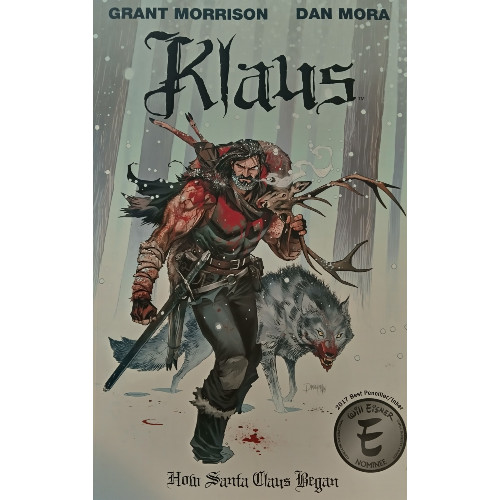
It's that time of year again.
Or…just past that time of year again.
Our family has a few traditions around the Christmas season, whether it's the movies we watch yearly, the treats we indulge in, the people we see. We exchange gifts, listen to the same songs, hang ornaments filled with memories and history on our fake Christmas tree. There's a lot of "sameness" each Christmas season, but some of the joy found in December comes through those traditions gaining strength over time.
Some folks have their annual readthroughs. They have stories they sit down and take joy in each season. When I was younger, my parents would read us the same Christmas-centric picture books–we have one photo from 20 years ago of my younger sister and me snuggled against my dad on the couch as he reads us a story, my four-month-old youngest sister in my arms. I'm sure this also extends to comics. Christmas brings with it memories of stories I first adored in December. It was around this time when I first encountered Chris Claremont's Uncanny X-Men back in high school; years earlier, shortly before Christmas kicked off, I first indulged in Batman: The Long Halloween; I received the first five issues of the Amazing Spider-Man arc "The Gauntlet" one Christmas and found myself drawn into Spidey's monthly adventures for the first time in a long time. And though I don’t have any "must read" Christmas comics I devour every year, I fondly remember specific stories: Kitty Pryde battling an alien while alone in the X-mansion on Christmas Eve in Uncanny X-Men #143; J. Jonah Jameson undergoing his own "Christmas Carol" experience in the 2004 Marvel Holiday Special; Spidey and the Human Torch teaming up against Sandman in the very first issue of (what else?) Marvel Team-Up.
I had hoped to publish this review a tad earlier, but with the customary hustle and bustle of the season, I found I couldn't craft as thematically appropriate a review as I wished before December 25th came right around that snow-encrusted corner. I'm not huge into tethering specific stories to specific days, but when I get an idea and can manage the timing correctly–like when I reviewed a Captain America collection the day before Independence Day–I try to make it work. So in honor of the recent festivities, I'm taking a look at a Christmas-tinged tale constructed around the myth of Kris Kringle.
Maybe it'll become a classic.
Klaus
Writer: Grant Morrison
Penciler: Dan Mora
Inker: Dan Mora
Colorist: Dan Mora
Letterer: Ed Dukeshire
Issues Collected: Klaus #1-7
Volume Publication Date: August 2019
Issue Publication Dates: November-December 2015, February-March 2016, May 2016-June 2016, August 2016
Publisher: Boom! Studios
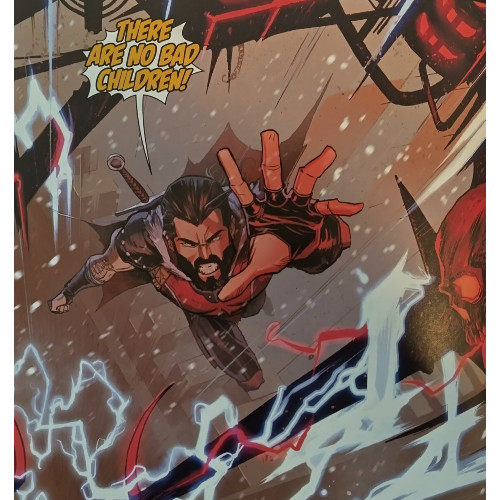
There is a truth on the front cover of my volume of Klaus…and on the back, there is a lie. Or, if not a lie, a misshapen truth.
The truth is that, as the cover states, this is the story of "How Santa Claus Began." It's a tagline, almost a subtitle, for the story. "Santa Claus: Year One" I've heard this series referred to multiple times online, a statement which the back cover (truthfully) trumpets. That connotation calls to mind "Batman: Year One," DC's 1987 retelling of Batman's origin in the aftermath of Crisis on Infinite Earths. That statement should give you at least a glimpse into the kind of story you're entering: the shaping of a mythic character, the blood-and-guts, blow-by-blow introduction to a man who has achieved legendary status. Who was St. Nick before he donned the red coat, grew a white beard, and annually descended upon the world to deliver gifts to good girls and boys? Other outlets have compared the series to Superman: Birthright, DC's early 2000s update on the origins of the Man of Steel. All three–Klaus, "Year One," Birthright–strive to peer behind the legends constructed around such famed protagonists and reach for the beating heart at the center of each man.
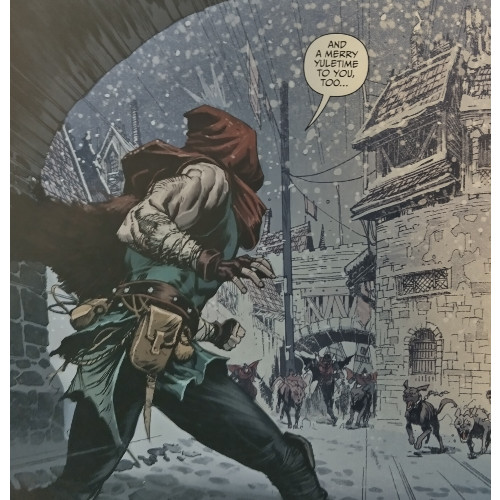
In this, Klaus succeeds. Grant Morrison and Dan Mora introduce a very human figure, not one who's necessarily unlikely to become a symbolic embodiment of the Christmas season, but one who is a man above all else. Klaus is not some magical being who can travel around the world in a single night. His initial forays into gift giving are very haphazard and human. Instead of piloting a sleigh pulled by flying reindeer, he scales walls with a makeshift grappling hook, bounding from rooftop to rooftop. He's fully reliant on his own wit, will, and tenacity. You want to see a version of Santa skulking around corners, slipping through the shadows, reconsidering his plans when cornered? This is your guy. He’s Bat-Santa. Banta? Banta.
This is, it seems, where the comparisons to the Frank Miller/David Mazzuchelli classic begin. Much like Klaus, Bruce Wayne in "Year One" is not yet a symbol. He's not the mythic, nearly monstrous figure found in Miller's Dark Knight Returns either, more a shadow spoken about in hushed whispers than human. He's a novice, capable of handling himself in a fight but very clearly outmatched in a world where he doesn’t have his gadgets or weapons. Klaus, too, is not some hero, at least not yet. He's more of a Robin Hood character, sneaking in and out of a city besieged by bitterness and ruled by a cruel lord. His actions begin to create a legend around him, and much like Gotham City's Caped Crusader, Klaus uses the stories to his advantage. But at the outset, he's vulnerable. He's smart, but he's not yet paid the price of heroism.
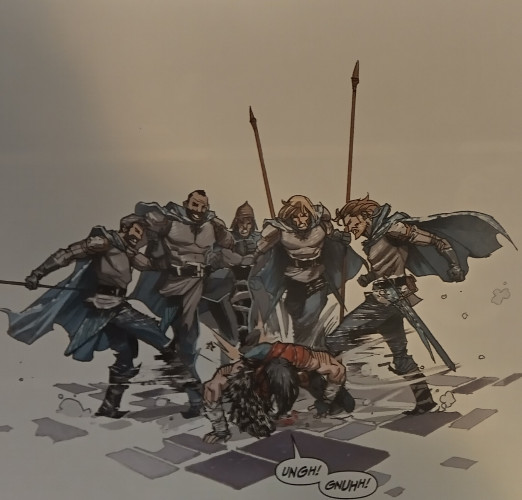
Where Birthright focused on a Clark Kent seeking his identity, Klaus knows who he is and what he will do from practically the beginning of his quest. We get no life-altering events to transform him into a gift-giving wunderkind (save some backstory). We learn to trust Klaus' inherent goodness, which I find to be a difficult thing for a writer to adequately convey in their character. Why should I care about the man in the red hood? Why does it matter that this Viking-sized, forest-dwelling forager becomes some mythical dude who spends the next several centuries breaking into houses, stealing cookies, and dropping gifts? By humanizing Klaus beyond just making him a physically vulnerable person, Morrison develops trust in us. This is a Santa who was betrayed, lost the love of his life. This is a Santa who has seen denizens of his own hometown suffer and becomes determined to bring back joy. It may be that the myth I already know of Santa helps endear me to the character more quickly than if Morrison was creating a brand new hero. I have a preset perspective I can overlay on who I feel this character is and judge Morrison's work based on those notions.
Given that, Morrison and Mora strike at the heart of who Santa Claus is. I know the character can often be associated with the commercialization of Christmas and draw attention away from the true spirit of the holidays. But the character, as Morrison and Mora define him, isn’t supposed to be some magic genie who just gives kids whatever toys they demand, beg, plead, and cry for before promptly discarding them for newer, shinier baubles. Santa doesn't give gifts for the sake of giving gifts…the gifts are gateways to joy. I've found, particularly in recent years, that the joy of opening gifts with my family on Christmas is, in part, dependent on what I receive (I'm not all that selfless, I'll admit), but joy is also found elsewhere. I feel it when I know someone has gifted me something they felt would connect with or represent me in some way. I feel it when I find a gift I feel will connect with or represent someone else. I feel it when someone opens a gift and that connection resonates with them.
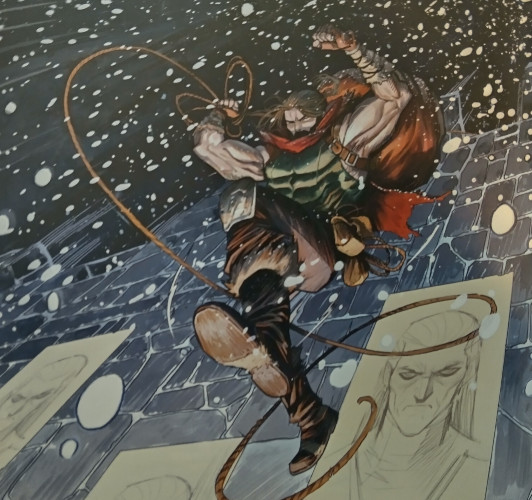
So our Klaus gives gifts to show the people of a beleaguered city that someone, at least one person, understands them well enough to offer a gateway out of the shadows of their dreary, overburdened lives. Eventually, Klaus offers an escape from the darkness, but for a while, he gives pinpricks of light. Because it seems even Klaus realizes the gift will not be sustainable. And if this were just a story about a man instituting a yearly gift-giving tradition in a city under cruel dominion, we wouldn’t feel like Klaus has done enough. A wooden top or bird is but a momentary distraction, and as the series develops, we root for Klaus to become more involved. Morrison and Mora don't necessarily update or modernize Klaus, save for perhaps making him more of a bear of a man striking at governmental cruelty (I don't know if "Santa Claus, rabble-rouser" is an angle anyone else has ever introduced). Threads found in Santa lore do exist–his gift giving, his use of chimneys, his eventual employment of a sleigh. While Morrison offers some logical reasons for those mythic qualities, the writer isn't as interested in reshaping Santa from his boots to his red cap. This is more an examination, as mentioned above, of Santa's impact and influence, through Klaus. It strikes more deeply at why the character may act the way he does, outside of a nice Christmastime legend to tell kids. If there were a Santa, this story seems to ask us to consider, what would be his motivation? What would drive an ordinary man to embrace such a generous lifestyle on such a global scale?
"There are no bad children" Klaus tells us at one point, and though I wonder about the truthfulness of that statement, the line ties into the themes Morrison and Mora bring to the series. Beyond its semantics briefly ruffling my feathers, a deeper notion awaits: the "bad children," historically in Santa Claus lore, don't get the same gifts as good children. They're denied that privilege. Perhaps Klaus' statement here is better rephrased as, "Everyone deserves a gift." "Why is nothing ever good enough?" a young boy, the son of the series' antagonist, asks no one in particular when he demolishes a hand-crafted gift. "What is wrong with me?" he later asks when a Klaus-crafted toy stolen from another child doesn’t work for him. The boy is insightful enough to know something is wrong–he recognizes his own dissatisfaction and can see how the gift itself provides fleeting relief. Morrison points to the boy's struggle as evidence of that line I quoted–under his father's thumb, the boy will never be satisfied. His father has instilled in him the notion that no gift will ever be good enough, primarily because the boy is only given gifts to be satisfied. You get a sense no one has actually ever gifted the boy with anything…he just accumulates toys, trying to fill a rapidly expanding hole. It's not just the gift; it's how the gift is given. Perhaps if the boy were to see the love put into a gift given him, he'd become more grateful.
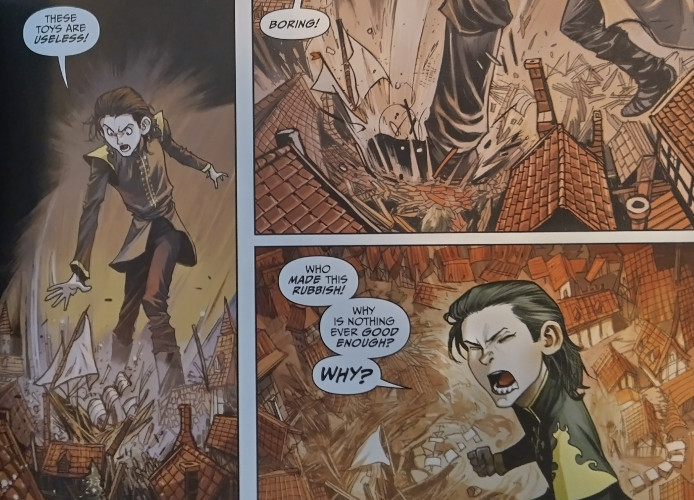
Every Christmas, my family creates wish lists of gifts and sends them to each other, ideas of what we could purchase based on wants and needs. But we also keep our eyes open for ideas which may have never occurred to the list-writer. Sometimes, months before the holiday season begins, we'll spot something in a store or online, something that makes us think of that person. Occasionally, someone will drop a few words or sentences that make me realize that person may appreciate a particular gift. This year, I opened a blanket bought by my parents featuring an assortment of covers from various Spider-Man comic series. Amazing Spider-Man, Spectacular Spider-Man, Marvel Team-Up, etc. I hadn't asked for a blanket, but someone had seen the blanket and it reminded them of me. There was consideration put into the gift beyond "I'll buy this listed item on Amazon." There was connection, thought, a personal hand in choosing the gift. I'm very happy with it. The blanket not only looks cool, it's also very comfortable. I've taken at least one nap bundled in it already, and as the winter rolls on, I'll certainly find myself nestled under it on many more occasions. The blanket was not bestowed upon me as some reward for behaving properly. It was given to me as a gesture of love from someone who recognized the joy I may find in such a gift.
It's not just the gift; it's how the gift is given.
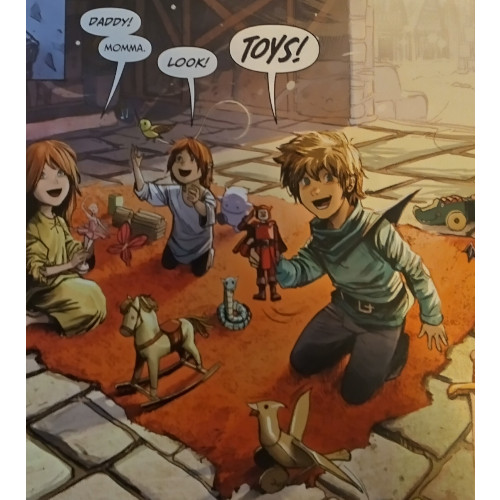
There's something comforting, I think, about the image of a jolly old man, dressed warmly in bright red, delivering the exact gift a child would love. It's not just the magic associated with the impossible task of delivering gifts the world over each year or the wonder of an entire workshop devoted to making the right toys for the right children. It's the person of St. Nick himself, the knowledge of a singular individual who knows you so well he can give you that perfect gift. In Klaus, those gifts are representative of the man–the vulnerable Klaus, the human Klaus, the not-yet-a-legend Klaus–and the genuine kindness he pours out for strangers, clambering up walls and dispensing toys down chimneys. But the toys are representative of a deeper truth, signposts pointing to a deeper freedom than the momentary exultation over a gift. Klaus becomes a freedom fighter, sent not only to temporarily alleviate the struggle of a town but to help them find true liberation out from under a lord who dictates their days harshly. Klaus comes to liberate a selfish boy who's only a snot-nosed brat because, let's face it, he knows no other way to live. It's love gifted in the face of fear.
On the back cover, as I said, is a lie. The copy touts this series as answering the question, "[W]hat does Santa Claus do on the other 364 days a year?" The series doesn't answer that question, not really. It offers the promise of giving an answer, right at the end, but the story isn't about exploring what Santa does on every day besides Christmas Eve. That would make for an intriguing direction for a different series, but Klaus is more concerned with establishing who Santa was before he became the cookie-crunching, sleigh-sailing, reindeer-wrangling legend we know today. If the "Batman: Year One" comparisons intrigue you, give this series a shot. If you're looking for a comic to read while you cozy up to the fire (maybe under a new blanket) on a cold winter evening, this should provide some additional warmth. Heck, if you're just looking for a good Grant Morrison comic that isn't as violent as WE3 or as philosophically daunting as Arkham Asylum: A Serious House on Serious Earth, this should find that comfortable medium between smart and entertaining, with only a dash of darkness. You could do worse than gifting yourself this series this year or as other Christmases roll around, even if you’re just looking for a pictorial reminder of why we give gifts…and how we give them.